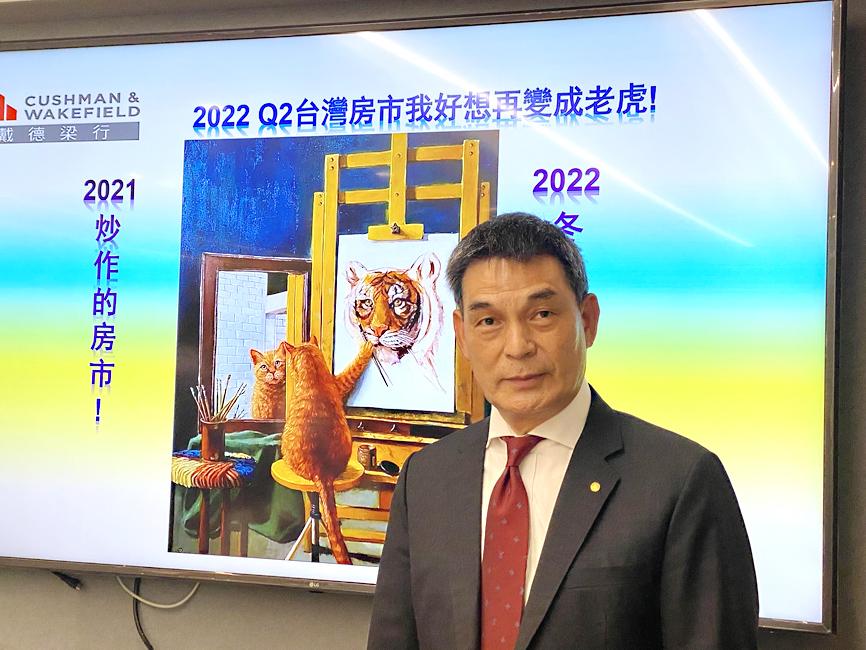Land transactions last quarter fell to a three-year low of NT$44.5 billion (US$1.55 billion), as credit controls and interest rate increases generated caution among developers, the local branch of international property consultancy Cushman & Wakefield said last week.
“This segment of the property market has sensed the chilling effect caused by waves of credit controls and the interest rate hike in March,” Cushman & Wakefield Taiwan said.
Even though the central bank last month said its policy rate increase of 25 basis points was not aimed at the property sector, the move would raise costs of land purchases and make developers wary, the consultancy said.

Photo: CNA
The chilling effect would be more evident for small and medium-sized developers, as their larger peers have deep pockets and are therefore less susceptible to rate hikes, it said.
Affluent developers would likely press ahead with land acquisition to meet development needs, but they would grow more cost-conscious, Cushman & Wakefield Taiwan said.
They would also focus on joint ventures involving urban renewal projects and development projects integrated with metropolitan railway systems given a small pool of choices, it added.
The shift in sentiment is unfavorable for land transactions for the rest of the year, and the lack of supply on the horizon would also weigh on the market, it said.
Against that backdrop, market watchers should pay close attention to upcoming sales of a 26,900 ping (88,926m2) residential plot and a 17,200 ping mixed-use plot in Taoyuan’s Jhongli District (中壢), it said.
The parcels could generate NT$13 billion in sales for tire maker Federal Corp (泰豐輪胎), the owner of the plots, the consultancy said.
Another major deal this quarter would be a 2,000 ping plot in New Taipei City’s Sanchong District (三重), it said.

SEMICONDUCTORS: The German laser and plasma generator company will expand its local services as its specialized offerings support Taiwan’s semiconductor industries Trumpf SE + Co KG, a global leader in supplying laser technology and plasma generators used in chip production, is expanding its investments in Taiwan in an effort to deeply integrate into the global semiconductor supply chain in the pursuit of growth. The company, headquartered in Ditzingen, Germany, has invested significantly in a newly inaugurated regional technical center for plasma generators in Taoyuan, its latest expansion in Taiwan after being engaged in various industries for more than 25 years. The center, the first of its kind Trumpf built outside Germany, aims to serve customers from Taiwan, Japan, Southeast Asia and South Korea,

POWERING UP: PSUs for AI servers made up about 50% of Delta’s total server PSU revenue during the first three quarters of last year, the company said Power supply and electronic components maker Delta Electronics Inc (台達電) reported record-high revenue of NT$161.61 billion (US$5.11 billion) for last quarter and said it remains positive about this quarter. Last quarter’s figure was up 7.6 percent from the previous quarter and 41.51 percent higher than a year earlier, and largely in line with Yuanta Securities Investment Consulting Co’s (元大投顧) forecast of NT$160 billion. Delta’s annual revenue last year rose 31.76 percent year-on-year to NT$554.89 billion, also a record high for the company. Its strong performance reflected continued demand for high-performance power solutions and advanced liquid-cooling products used in artificial intelligence (AI) data centers,

Gasoline and diesel prices at domestic fuel stations are to fall NT$0.2 per liter this week, down for a second consecutive week, CPC Corp, Taiwan (台灣中油) and Formosa Petrochemical Corp (台塑石化) announced yesterday. Effective today, gasoline prices at CPC and Formosa stations are to drop to NT$26.4, NT$27.9 and NT$29.9 per liter for 92, 95 and 98-octane unleaded gasoline respectively, the companies said in separate statements. The price of premium diesel is to fall to NT$24.8 per liter at CPC stations and NT$24.6 at Formosa pumps, they said. The price adjustments came even as international crude oil prices rose last week, as traders

SIZE MATTERS: TSMC started phasing out 8-inch wafer production last year, while Samsung is more aggressively retiring 8-inch capacity, TrendForce said Chipmakers are expected to raise prices of 8-inch wafers by up to 20 percent this year on concern over supply constraints as major contract chipmakers Taiwan Semiconductor Manufacturing Co (TSMC, 台積電) and Samsung Electronics Co gradually retire less advanced wafer capacity, TrendForce Corp (集邦科技) said yesterday. It is the first significant across-the-board price hike since a global semiconductor correction in 2023, the Taipei-based market researcher said in a report. Global 8-inch wafer capacity slid 0.3 percent year-on-year last year, although 8-inch wafer prices still hovered at relatively stable levels throughout the year, TrendForce said. The downward trend is expected to continue this year,